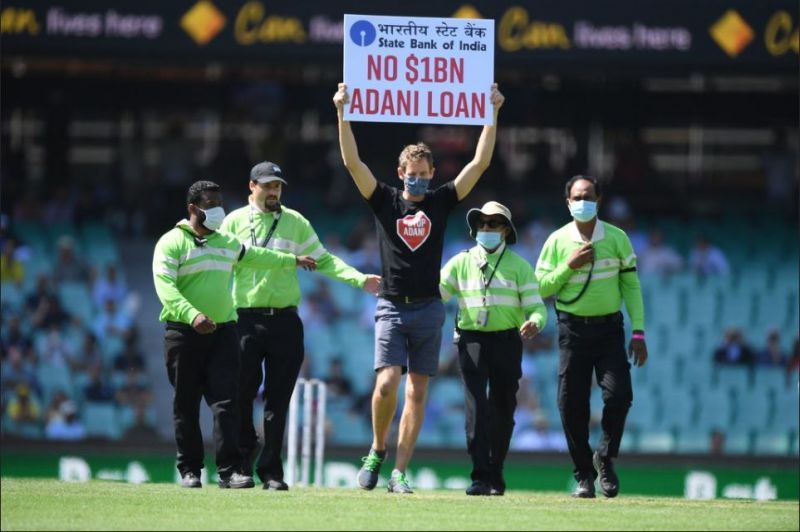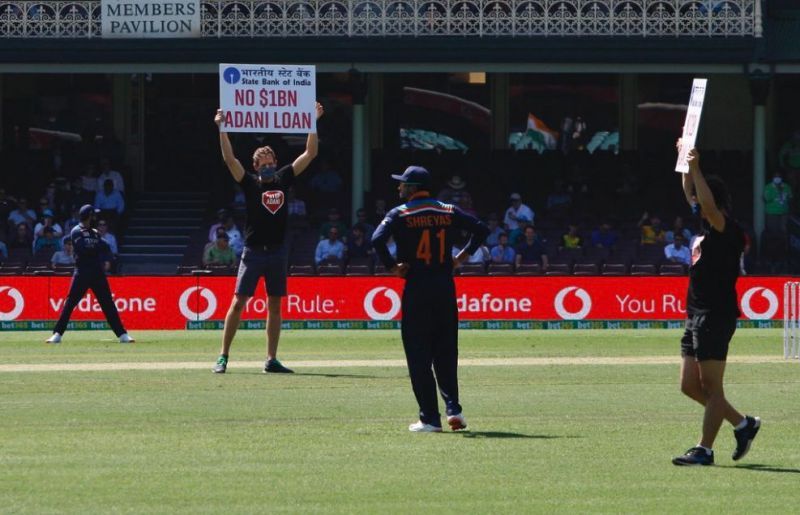
IND v AUS 2020: Protests disrupt 1st ODI over $1bn State Bank of India loan for Adani’s coal
![Protestors on the field during the IND v AUS 1st ODI [PC: Flickr.com]](https://statico.sportskeeda.com/editor/2020/11/26244-16064576501649-800.jpg?w=500)
The first cricket match between India and Australia at the Sydney Cricket Ground was disrupted today by Ben Burdett and Josh Winestock to draw attention to a potential $1 billion (5000 crore) loan of Indian taxpayers’ money from the State Bank of India to Adani’s controversial coal project in Queensland, Australia.
The men ran onto the field in the first few minutes of the game and sprinted towards the pitch carrying placards reading: “State Bank of India – No $1bn Adani loan”.
Indian media reports from last week suggesting the State Bank of India is close to finalising the loan for Adani’s coal mine have triggered protests around the world. Ben and Josh staged a protest of their own today, calling on the State Bank to use public money for public good during the current health crisis, and not on a billionaire’s controversial and climate-wrecking coal project.
The loan could provide funds that Adani needs to dig the coal mine and build the rail line to open up the Galilee Basin, fuelling climate change impacts such as bushfires, droughts and heatwaves, and trashing the rights of Traditional Owners in Australia and India.
Father of two and Sydney resident Ben Burdett said, “Millions of Indian taxpayers who are watching the first game of the Indian cricket tour have a right to know that the State Bank of India is considering handing their taxes to a billionaire’s climate wrecking coal mine. As India struggles with the COVID-19 pandemic, this money should be spent on looking after vulnerable people, not supporting coal billionaires with close ties to Indian Prime Minister Narendra Modi.”
“Last summer, Australia choked on smoke from bushfires while people’s homes burnt and billions of animals perished. It would be reckless for the State Bank of India to fund Adani’s climate-wrecking coal mine. Mining and burning this coal will fuel climate impacts in Australia and India, bringing more droughts, floods, deadly heat waves, and bushfires. Adani’s proposed coal mine is planned to be one of the largest new coal mines in the world and will have disastrous consequences for the global climate.”
Josh Winestock, a musician from Sydney, said “Adani’s Carmichael coal project has a long history of environmental destruction, breaking laws, pollution incidents, trashing the wishes of Traditional Owners in Australia, and displacing local farmers and indigenous people India. The State Bank of India must rule out any loan to Adani for their climate wrecking coal mine.
“No bank in the world is willing to lend to Adani’s climate wrecking coal mine, because the project stinks. Adani’s coal is brand kryptonite for the reputation of companies who dare to associate with it. State Bank of India must join with the 89 other companies who have refused to work with Adani’s climate wrecking coal project and reassure Indians and Australians that they will play no part in supporting it.”
Why did the protestors come on the ground during the IND v AUS 1st ODI?

State Bank of India backed away from a proposed $1 billion loan to Adani for the Carmichael coal project in 2015. The decision to grant the loan was made during Indian Prime Minister Narendra Modi's visit to Australia where he and Gautam Adani attended the G20 conference in Brisbane.
Indian opposition politicians slammed the loan, calling it ‘crony capitalism’, that would hand Indian tax payers’ money to a billionaire for a coal project in Australia.
Adani has been forced to self finance the Carmichael coal project after failing to secure finance from private companies. 89 companies have now committed to not supporting the controversial project. The State Bank of India is now at risk of using public funds to finance a project the private sector has shunned, with Indian taxpayers footing the bill.